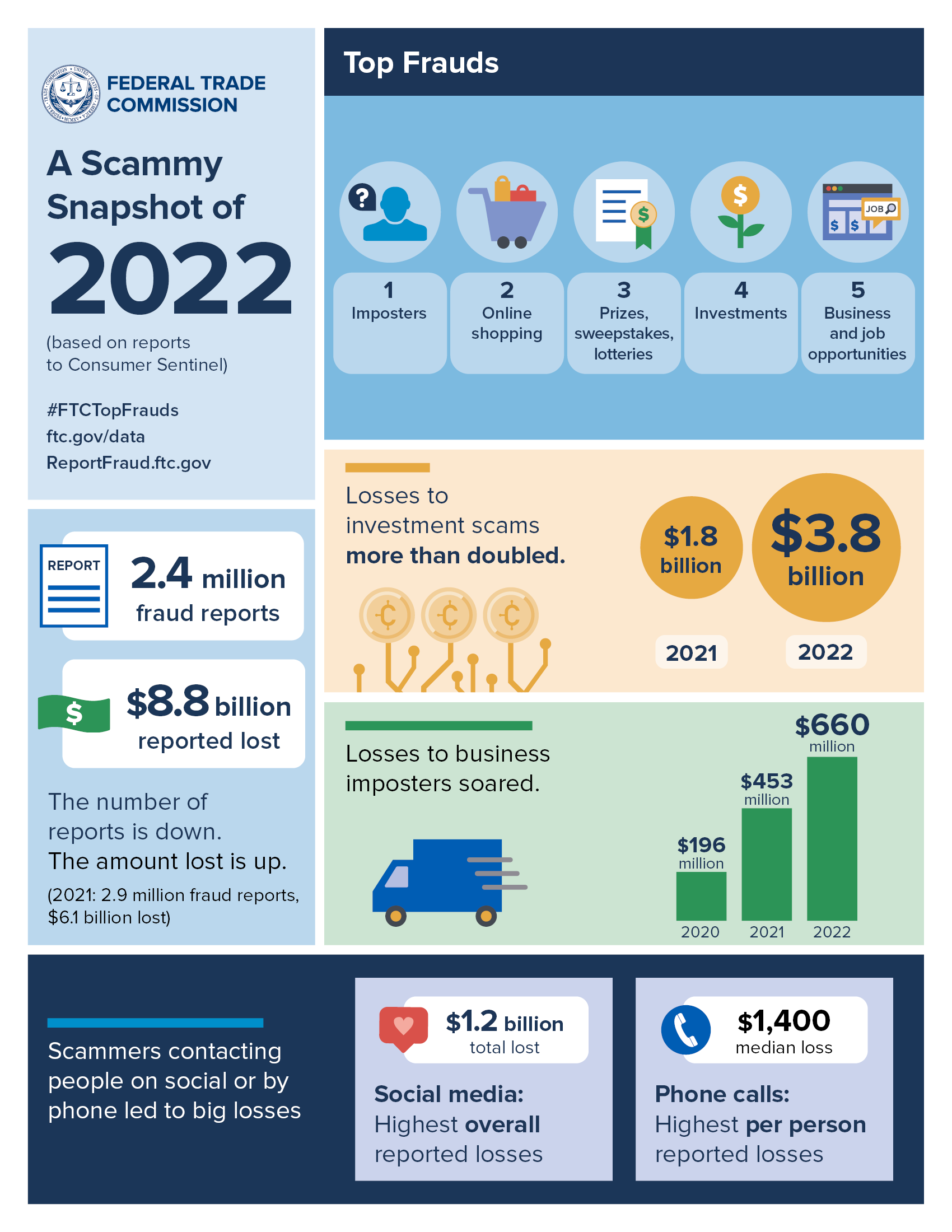Scams Cost Consumers $8.8 Billion in 2022 — The Top Five Frauds
Losses from scams jumped to shocking new highs last year. These are the five most common frauds.


Profit and prosper with the best of Kiplinger's advice on investing, taxes, retirement, personal finance and much more. Delivered daily. Enter your email in the box and click Sign Me Up.
You are now subscribed
Your newsletter sign-up was successful
Want to add more newsletters?

Delivered daily
Kiplinger Today
Profit and prosper with the best of Kiplinger's advice on investing, taxes, retirement, personal finance and much more delivered daily. Smart money moves start here.

Sent five days a week
Kiplinger A Step Ahead
Get practical help to make better financial decisions in your everyday life, from spending to savings on top deals.

Delivered daily
Kiplinger Closing Bell
Get today's biggest financial and investing headlines delivered to your inbox every day the U.S. stock market is open.

Sent twice a week
Kiplinger Adviser Intel
Financial pros across the country share best practices and fresh tactics to preserve and grow your wealth.

Delivered weekly
Kiplinger Tax Tips
Trim your federal and state tax bills with practical tax-planning and tax-cutting strategies.

Sent twice a week
Kiplinger Retirement Tips
Your twice-a-week guide to planning and enjoying a financially secure and richly rewarding retirement

Sent bimonthly.
Kiplinger Adviser Angle
Insights for advisers, wealth managers and other financial professionals.

Sent twice a week
Kiplinger Investing Weekly
Your twice-a-week roundup of promising stocks, funds, companies and industries you should consider, ones you should avoid, and why.

Sent weekly for six weeks
Kiplinger Invest for Retirement
Your step-by-step six-part series on how to invest for retirement, from devising a successful strategy to exactly which investments to choose.
Scams continued to break records for separating consumers from their hard-earned money in 2022. New data from the Federal Trade Commission (FTC) reveals that last year, consumers reported a huge increase in losses from fraudsters compared to the previous year. See the top five scams and find out what you can do to safeguard your assets and not fall victim to a fraudster.
2022 scams shatter previous records
2.4 million consumers contacted the FTC to report scams last year. Their reported $8.8 billion lost from fraud represent an alarming 30% jump from 2021's total —$6.1B lost from scams.
Despite a decrease in scam reports (from 2.9M to 2.4M year over year) the average consumer loss increased by nearly 75%. The average loss per consumer in 2022 was $3,666, as compared to $2,103 in 2021.
From just $107.88 $24.99 for Kiplinger Personal Finance
Become a smarter, better informed investor. Subscribe from just $107.88 $24.99, plus get up to 4 Special Issues

Sign up for Kiplinger’s Free Newsletters
Profit and prosper with the best of expert advice on investing, taxes, retirement, personal finance and more - straight to your e-mail.
Profit and prosper with the best of expert advice - straight to your e-mail.
Investment scams accounted for $3.8B in losses in the U.S., more than double the $1.8B 2022 total. This corresponds to a record year for cryptocurrency hacking, which cost crypto owners worldwide an oddly identical $3.8B.
Social media was the most lucrative medium for scammers, accounting for $1.2B of total losses. Phone calls resulted in the highest median loss at $1,400 per person. Average consumer losses to scams have increased steadily each year since 2018. FTC data on the top fraud category, imposter scams, illustrates the yearly upward trend:
- 2018: $492.0M in total consumer losses reported
- 2019: $900.2M
- 2020: $1.229.4M
- 2021: $2,400.6M
- 2022: $2,666.7M
Top frauds by category
The FTC’s Consumer Sentinel Network tracks all consumer fraud complaints by category. Below, we break down the top five fraud categories of 2022 by total complaints and percentage of overall reports filed:
| Category | Number of Reports | Total $ Loss | Median $ Loss |
|---|---|---|---|
| 1. Imposter Scams | 725,989 | $2,666.7M | $1,000 |
| 2. Online Shopping | 327,609 | $358.1M | $180 |
| 3. Prizes, Sweepstakes, Lotteries | 143,132 | $301.9M | $907 |
| 4. Investments | 104,703 | $3,820.0M | $5,000 |
| 5. Business, Job Opportunities | 95,399 | $367.4M | $2,000 |
The FTC breaks down the concerning data in the following graphic:

How to protect yourself
Consider these tips to guard against the most common types of scams:
- Never trust caller ID on your phone, especially when the caller asks for private information. Banks will never call and ask you for that info over the phone, to avoid this exact scenario. Reach out to your bank or credit card company via their mobile app or via their official phone number.
- Be skeptical of online shopping sites and email offers with suspiciously low prices, no return policy, or missing/negative online reviews.
- Never share passwords or numbers for Social Security, credit cards, or bank accounts.
- Don't send money to someone you don’t know, even if you've been chatting online through a dating platform or social media. If you've never met in person, and they ask for funds, there's a high likelihood they're trying to scam you.
- Watch out for scam job listings that guarantee you a job or demand money for training, certification or supplies.
- Designate a trusted contact on your financial accounts that the bank can contact if they detect potential scams or financial exploitation.
- Put your number on the National Do Not Call Registry to avoid robocalls from scammers. Go to www.donotcall.gov or call (888) 382-1222.
- Submit complaints about scammers and fraudulent activities to www.consumerfinance.gov/complaint.
Related Content
- Beware Fake Disney Plus Emails That Steal Your Bank Information
- Text Scams: How to Avoid (and Report) Them
- Romance Scams to Beware — Signs of a Scammer at Work
- Scam Report: FTC Says Older Adults Targeted
Profit and prosper with the best of Kiplinger's advice on investing, taxes, retirement, personal finance and much more. Delivered daily. Enter your email in the box and click Sign Me Up.

Ben Demers manages digital content and engagement at Kiplinger, informing readers through a range of personal finance articles, e-newsletters, social media, syndicated content, and videos. He is passionate about helping people lead their best lives through sound financial behavior, particularly saving money at home and avoiding scams and identity theft. Ben graduated with an M.P.S. from Georgetown University and a B.A. from Vassar College. He joined Kiplinger in May 2017.
-
 Quiz: Do You Know How to Avoid the "Medigap Trap?"
Quiz: Do You Know How to Avoid the "Medigap Trap?"Quiz Test your basic knowledge of the "Medigap Trap" in our quick quiz.
-
 5 Top Tax-Efficient Mutual Funds for Smarter Investing
5 Top Tax-Efficient Mutual Funds for Smarter InvestingMutual funds are many things, but "tax-friendly" usually isn't one of them. These are the exceptions.
-
 AI Sparks Existential Crisis for Software Stocks
AI Sparks Existential Crisis for Software StocksThe Kiplinger Letter Fears that SaaS subscription software could be rendered obsolete by artificial intelligence make investors jittery.
-
 Beware Fake Disney Plus Emails That Steal Your Bank Information
Beware Fake Disney Plus Emails That Steal Your Bank InformationFake Disney Plus billing messages enable scammers to access your bank account and drain your funds.
-
 Romance Scams to Beware — Signs of a Scammer at Work
Romance Scams to Beware — Signs of a Scammer at WorkPeople seeking love and connection are attractive targets for fraudsters. Avoid these romance scams that prey on your best intentions.
-
 Banking Scams: Beware Fraudsters Impersonating Your Bank
Banking Scams: Beware Fraudsters Impersonating Your BankScams — and the criminals behind them — are getting more creative in separating victims from their money.
-
 Free Credit Monitoring for Equifax Breach Victims
Free Credit Monitoring for Equifax Breach Victimscredit reports Millions of consumers whose data may have been exposed have been notified to sign up for the monitoring service.
-
 Scammers Target Last-minute Shoppers
Scammers Target Last-minute ShoppersScams Products may be in short supply, but potential thieves are not. Be “scam smart” to keep your holiday happy.
-
 2 Credit Card Gotchas to Watch Out For
2 Credit Card Gotchas to Watch Out Forcredit cards After an infuriating wake-up call with her own credit card company, one financial services consultant wants consumers to know something: It’s smart to pay attention to the details, even if you’ve been using the same credit card for years.
-
 Seven Things to Do Right Away If You're a Victim of a Data Breach
Seven Things to Do Right Away If You're a Victim of a Data Breachcredit & debt In today's digital age, data breaches have become all too common and leave unsuspecting consumers vulnerable to a host of identity theft issues.
-
 Look Out for These Scams
Look Out for These ScamsScams Stay alert for phony sales at stores and other tricks.